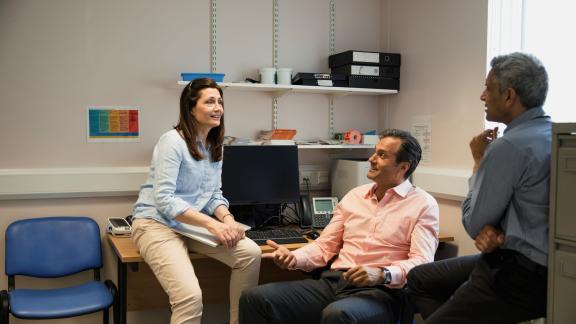Module one: The role and purpose of primary care networks

Reflections from Dr Rupa Joshi and Louise Wheeler on module one of the South East Primary Care Network (PCN) Leadership Development Programme.
As primary care leaders, understanding what’s happening in our context and its impact for us is a critical skillset. The true purpose of primary care networks (PCNs) is to improve the health of our patients, wholly utilising the resources within our communities. However, due to constraints through the pandemic, and also the contract restrictions, really engaging our communities has not been possible for many PCNs, with the focus mainly being around the GP practices working collaboratively.
Through the Fuller stocktake implementation plans, PCN leaders are now being asked to look at neighbourhood working to truly integrate with our communities and define our shared purpose across our health and social care landscape. This brings forward questions about what this will mean for PCNs in the future: how will we achieve true integration and co-production? How can we work with patients as partners? How can we ensure that our staff feel properly valued?
Reflections on pandemic innovations
Leaders in the focus groups shared with us how impactful it has been to have the space and structure to reflect on the pandemic and discuss the innovations that led to new models of care, and then consider the conditions were that were present that supported those changes.
As PCN leaders, we understand that networks need to have a shared purpose to function. Leadership without focus and purpose doesn't produce results.
“We make decisions on where we think we ought to go and where we should be pushing our energies because otherwise, we're kind of all busy doing. I just feel like we just need to get a bit more organised. Where are we going to direct our focus? And then we'll have more of an impact." PCN leader and programme participant.
The importance of community and working through interconnected networks is a key component of how primary care needs to deliver, now and in the future. We have learned from the Fuller stocktake that primary care should focus on prevention and proactive care, integrated neighbourhood teams, and urgent care. As complexity increases, practices and PCNs cannot do this alone - we need to deliver through networks and partnerships. If we want to see large-scale change, we need to be applying system thinking in all areas of the system.
…we need to be conscious of what we prioritise, at a time when capacity is stretched
Primary care networks work when there is a clear shared purpose and identity; when there is space for creativity and innovation; when the network is meeting the needs of its members; when there is trust and members have formed meaningful relationships; and when there is adaptive leadership and helpful outputs.
All of this means that we need to be conscious of what we prioritise, at a time when capacity is stretched. Primary care network members each come with a different set of drivers and great leadership ensures that they all have their voices heard. To ensure that this happens, teams need to build collective values and culture. Alignment can be difficult, particularly when there are different perspectives. Spending time with network members, to really understand their own challenges, and what matters to them is the first step to finding commonalities. This is particularly relevant for PCN leadership, and how it takes time to build relationships and engagement.
Network maturity
There will be different stages of maturity for every network, and it is important to explore different aspects of how they function. In this module we used a network maturity matrix to explore how participants viewed the maturity of their PCN and why. All leaders then had the opportunity to use this tool to ask their own PCN members to plot where they think they are following the programme.
This approach offers the chance to listen to different perspectives and encourages a valuable a conversation to explore where the network may want to get to and how this could be achieved by working together. It also acts as a strong primer for conversations using the new support level framework (SLF) for PCNs, which aims to provide ICSs and PCNs with a structured and systematic approach for understanding their transformation maturity and current support needs in relation to improvement and transformation, to develop a tailored action plan.
“In exploring the leadership lessons learned, what worked well and not so well, I understood the importance of embedding collective leadership, not individualised hierarchical leadership, to lead compassionate and inclusive team cultures, connecting with communities and collaborating with our local populations to enable large-scale change.” Dr Rupa Joshi.
Dr Rupa Joshi is a GP and clinical director for Wokingham North Primary Care Network and deputy chair of Berkshire West Primary Care Alliance; clinical adviser for NHS England’s Primary Care Transformation team; chair of the Workforce and Estates Design Group at NHS Confederation’s Primary Care Network; and clinical adviser for learning and development for the South East PCN Development Programme.
Louise Wheeler is the primary care leadership development consultant at the NHS Confederation.



